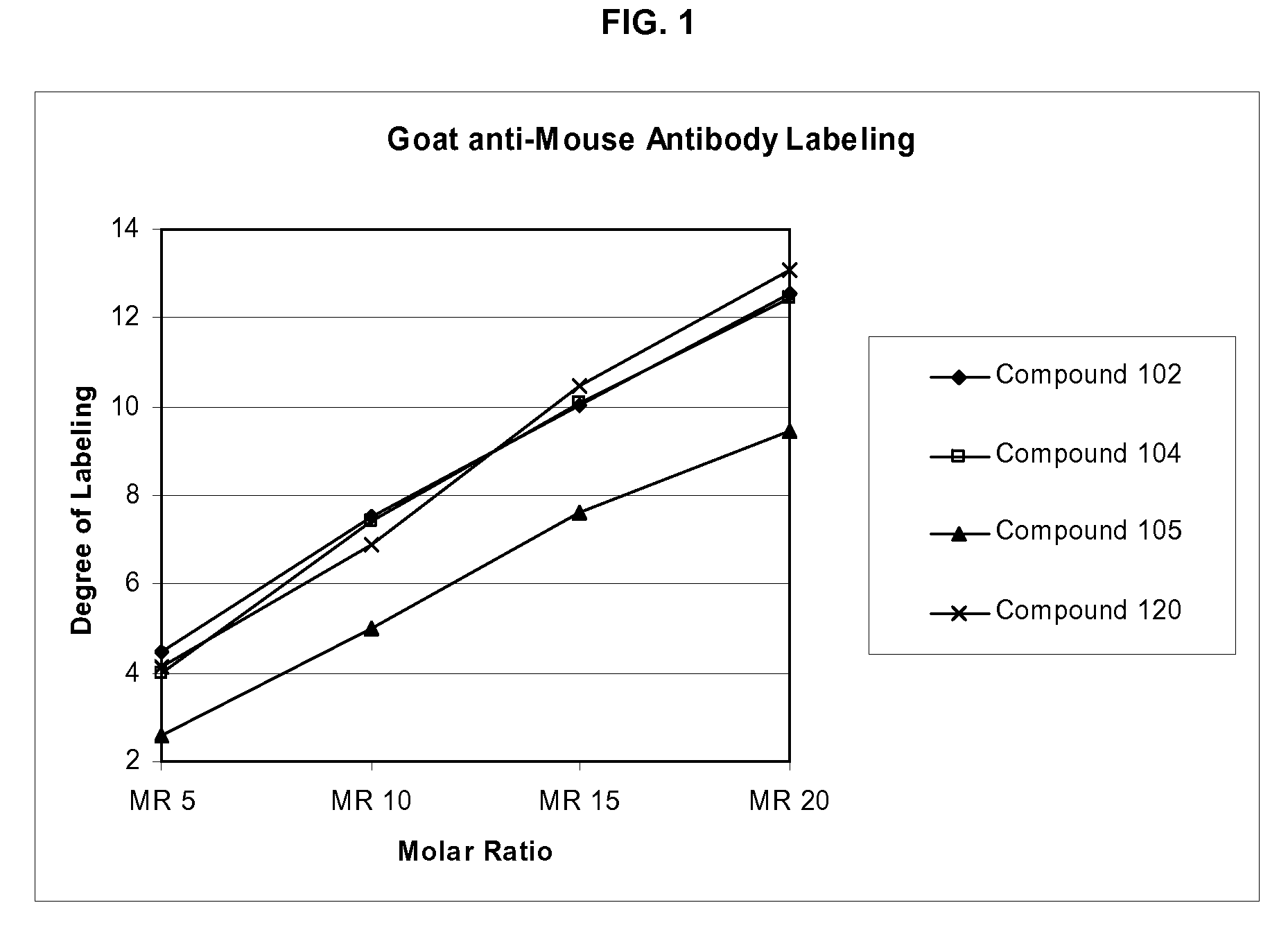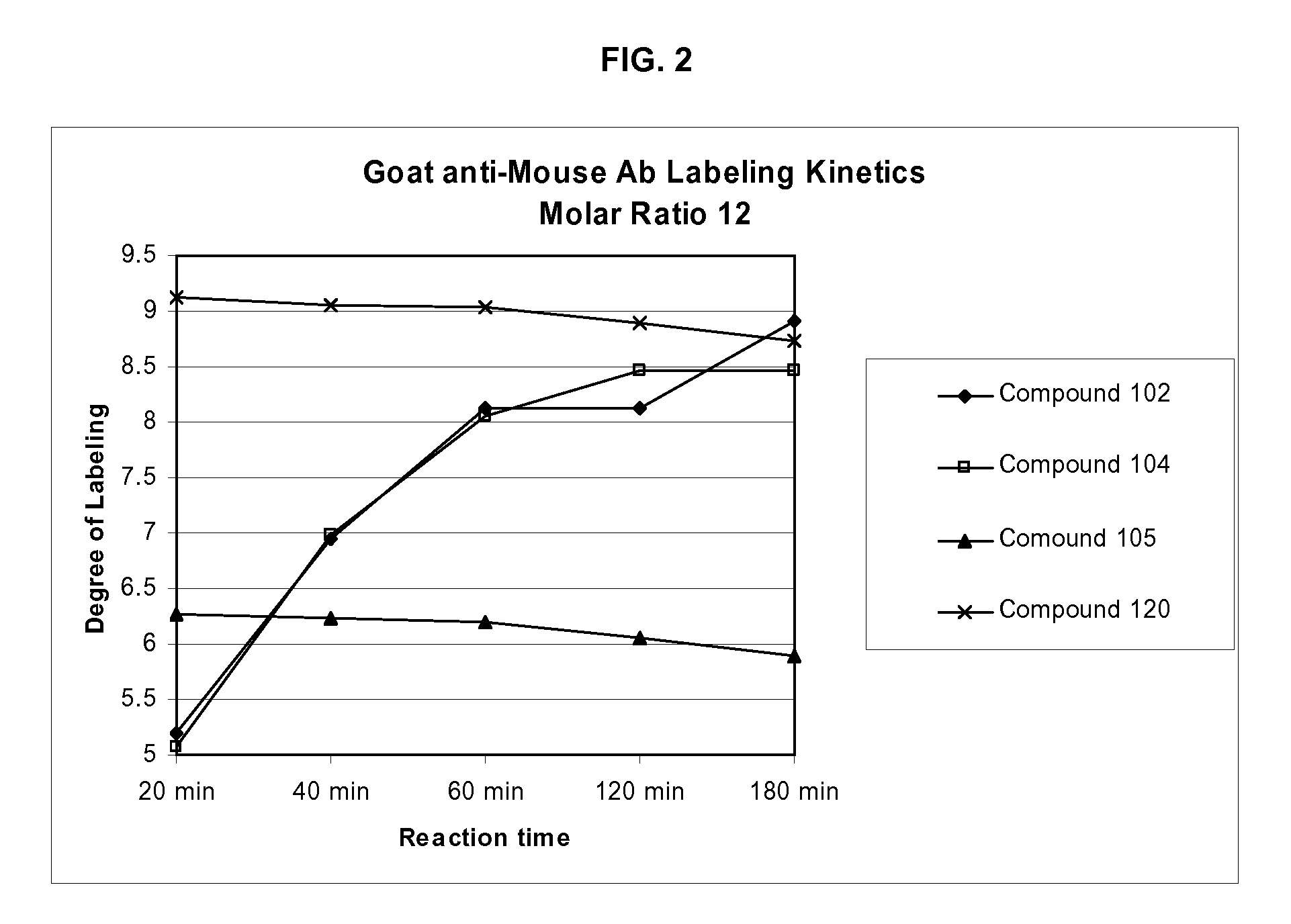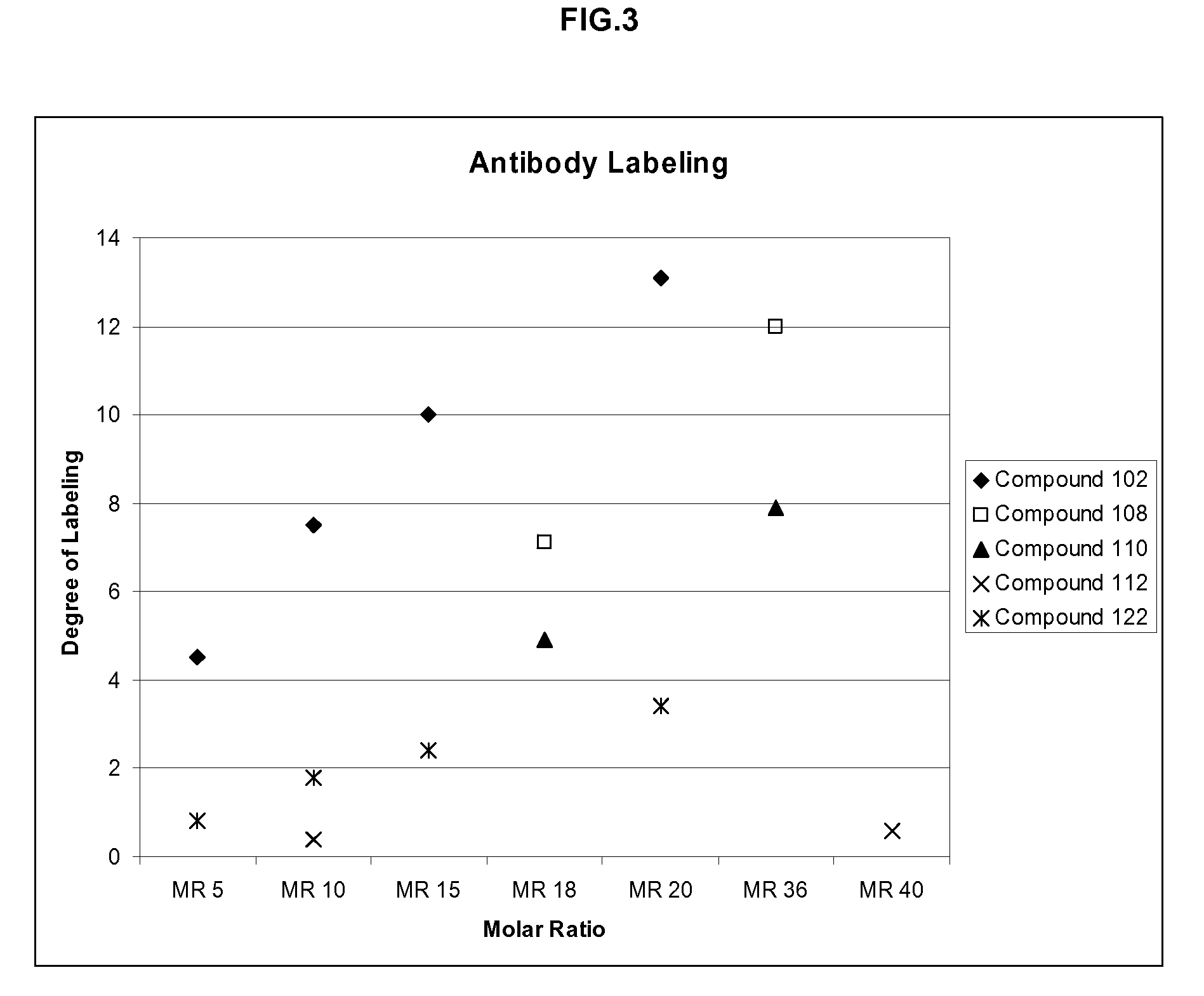Labeling reagents and methods of their use
a technology of labeling reagents and reagents, applied in the field of labeling reagents and methods of their use, can solve the problems of limiting the preparation, packaging, dispensing and purification conditions and their subsequent shelf life, most of the reagents used for biomolecule labeling in aqueous buffers, and the desired biomolecule is wasted, so as to achieve exceptional stability and great hydrolytic stability
- Summary
- Abstract
- Description
- Claims
- Application Information
AI Technical Summary
Benefits of technology
Problems solved by technology
Method used
Image
Examples
example 1
BODIPY ester of 2,6-difluoroactivated phenol, solubilized with sulfo group (compound 4)
[0438]
4-((3,5-difluoro-4-hydroxyphenyl)diazenyl)benzenesulfonic acid (2)
[0439]Sulfanilic acid (0.767 g, 4.43 mmol) was dissolved in hot mixture of 20 mL of water and 10 mL of conc. HCl. The solution was cooled in ice / NaCl bath to 0° C. giving a suspension of HCl salt. The solution of sodium nitrite (0.367 g, 5.32 mmol in 5 mL of water) was added dropwise to the suspension of ammonium salt, maintaining the temperature below +5° C. All solid dissolved and the resulting solution was stirred for 20 min. After that white precipitate formed again and the resulting suspension was added dropwise to the mixture of 2,6-difluorophenol (0.576 g, 4.43 mmol) in 10 mL of dioxane and KOH (10 g) in 15 mL of water, cooled in ice / water bath. The reaction mixture was stirred for 30 min in ice / water bath and then extracted with ethyl acetate (3×30 mL). The aqueous solution was acidified with 10% HCl to pH 2-3 and the ...
example 2
BODIPY ester of 2,6-dichloro activated phenol, solubilized with two carboxylic groups (compound 8)
[0441]
2-((3,5-Dichloro-4-hydroxyphenyl)diazenyl)terephthalic acid (6)
[0442]2-Aminoterephtalic acid (0.500 g, 2.76 mmol) was dissolved in hot mixture of 30 mL of water and 10 mL of conc. HCl. The solution was cooled in ice / NaCl bath to 0° C. giving a suspension of HCl salt. The solution of sodium nitrite (0.230 g, 3.33 mmol in 10 mL of water) was added dropwise to the suspension of ammonium salt, maintaining the temperature below +5° C. The resulting solution was stirred for 20 min and added dropwise to the solution of 2,6-dichlorophenol (0.450 g, 2.76 mmol) in 80 mL of 2M KOH, cooled in ice / water bath. The reaction mixture was stirred for 2 hrs in ice / water bath and then acidified with 10% HCl to pH 2-3 and extracted with ethyl acetate (3×30 mL). The combined extract was washed with brine (30 mL), dried over Na2SO4 and evaporated. The crude product was purified by column chromatography ...
example 3
BODIPY ester of 2,6-difluoro activated phenol, solubilized with two carboxylic groups (compound 10)
[0444]
2-((3,5-Difluoro-4-hydroxyphenyl)diazenyl)terephthalic acid (9)
[0445]2-Aminoterephtalic acid (1.00 g, 5.52 mmol) was dissolved in hot mixture of 60 mL of water and 20 mL of conc. HCl. The solution was cooled in ice / NaCl bath to 0° C. giving a suspension of HCl salt. The solution of sodium nitrite (0.460 g, 6.67 mmol in 10 mL of water) was added dropwise to the suspension of ammonium salt, maintaining the temperature below +5° C. The resulting solution was stirred for 20 min and then added dropwise to the solution of 2,6-difluorophenol (0.720 g, 5.53 mmol) in 50 mL of 1 M KOH, cooled in ice / water bath. The reaction mixture was stirred for 1.5 hrs in ice / water bath and then acidified with 10% HCl to pH 2-3. The resulting precipitate was collected, washed with water and dried in vacuum to give phenol 9 as an orange solid (0.5 g, 28%).
3-(3-(2,6-Difluoro-4-((2,5-dicarboxyphenyl)diazen...
PUM
| Property | Measurement | Unit |
|---|---|---|
| molar ratio | aaaaa | aaaaa |
| pH | aaaaa | aaaaa |
| pH | aaaaa | aaaaa |
Abstract
Description
Claims
Application Information
 Login to View More
Login to View More - R&D
- Intellectual Property
- Life Sciences
- Materials
- Tech Scout
- Unparalleled Data Quality
- Higher Quality Content
- 60% Fewer Hallucinations
Browse by: Latest US Patents, China's latest patents, Technical Efficacy Thesaurus, Application Domain, Technology Topic, Popular Technical Reports.
© 2025 PatSnap. All rights reserved.Legal|Privacy policy|Modern Slavery Act Transparency Statement|Sitemap|About US| Contact US: help@patsnap.com



